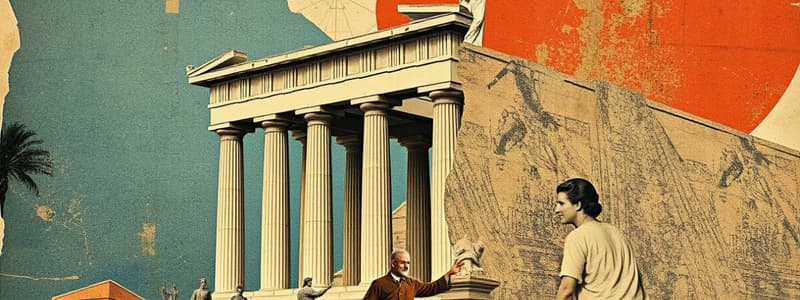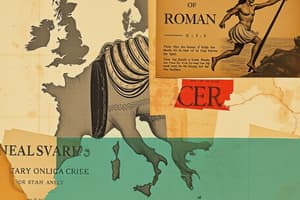Podcast
Questions and Answers
What was a significant contribution of ancient Greece to modern governance?
What was a significant contribution of ancient Greece to modern governance?
- Socialism advocated by philosophers
- Democracy as a form of government (correct)
- Feudalism as a political structure
- Monarchy as a ruling system
Who is known for introducing empirical observation to the field of medicine?
Who is known for introducing empirical observation to the field of medicine?
- Hippocrates (correct)
- Aristotle
- Socrates
- Galileo
What mathematical concept is Euclid credited with developing?
What mathematical concept is Euclid credited with developing?
- Geometry (correct)
- Statistics
- Number theory
- Calculus
Which architectural masterpiece is considered the epitome of Classical temple architecture in ancient Greece?
Which architectural masterpiece is considered the epitome of Classical temple architecture in ancient Greece?
What did the Etruscans contribute to the foundation of Roman culture?
What did the Etruscans contribute to the foundation of Roman culture?
What is the significance of the term 'mitzvot' in Judaism?
What is the significance of the term 'mitzvot' in Judaism?
Which branch of Buddhism is known for being more adaptive to local customs and reveres Buddha as god-like?
Which branch of Buddhism is known for being more adaptive to local customs and reveres Buddha as god-like?
What primary factor contributed to the formation of ghettos for Jews in Medieval Europe?
What primary factor contributed to the formation of ghettos for Jews in Medieval Europe?
Which concept in Hinduism refers to the liberation from the cycle of reincarnation?
Which concept in Hinduism refers to the liberation from the cycle of reincarnation?
What was the primary influence of Brahmanism on Hinduism?
What was the primary influence of Brahmanism on Hinduism?
What significant event marked the beginning of the Roman Republic in 509 BCE?
What significant event marked the beginning of the Roman Republic in 509 BCE?
Which governing body in the Roman Republic was primarily composed of wealthy citizens known as patricians?
Which governing body in the Roman Republic was primarily composed of wealthy citizens known as patricians?
What role did the Assemblies play in the Roman Republic?
What role did the Assemblies play in the Roman Republic?
Who was the first emperor of Rome, marking the transition from Republic to Empire?
Who was the first emperor of Rome, marking the transition from Republic to Empire?
What reforms did Augustus implement during his rule that had a significant impact on Roman society?
What reforms did Augustus implement during his rule that had a significant impact on Roman society?
What was one major consequence of the Crisis of the Third Century for the Roman Empire?
What was one major consequence of the Crisis of the Third Century for the Roman Empire?
Which historical figure is credited with the reform of the Roman calendar to create the Julian Calendar?
Which historical figure is credited with the reform of the Roman calendar to create the Julian Calendar?
What major change did Emperor Diocletian implement to help stabilize the Roman Empire?
What major change did Emperor Diocletian implement to help stabilize the Roman Empire?
Which of the following was a reason for the decline of the Roman Empire?
Which of the following was a reason for the decline of the Roman Empire?
What unique building material did the Romans invent that allowed for the construction of spacious interiors?
What unique building material did the Romans invent that allowed for the construction of spacious interiors?
What was one significant feature of Roman roads that contributed to their effectiveness?
What was one significant feature of Roman roads that contributed to their effectiveness?
How did the role of Latin influence the culture of Europe after the Roman conquests?
How did the role of Latin influence the culture of Europe after the Roman conquests?
What aspect of Roman literature is particularly notable?
What aspect of Roman literature is particularly notable?
Which significant religious tradition did the early Israelites develop during their journey from Egyptian slavery?
Which significant religious tradition did the early Israelites develop during their journey from Egyptian slavery?
What was one of the critical laws outlined in the Tanakh that is still observed by many Jews today?
What was one of the critical laws outlined in the Tanakh that is still observed by many Jews today?
What successful interaction characterized the relationship between rich and poor Romans?
What successful interaction characterized the relationship between rich and poor Romans?
What major architectural structure exemplifies Roman innovation and use of concrete?
What major architectural structure exemplifies Roman innovation and use of concrete?
Study Notes
Ancient Greece
- The Classical era (c. 510-323 BC) marked the peak of ancient Greek civilization, influencing philosophy, science, art, and government.
- Socrates, Plato, and Aristotle established the foundations of Western philosophy.
- Hippocrates advanced medicine by introducing empirical observation.
- Natural philosophers created the geocentric model of the universe and demonstrated the Earth’s spherical shape using mathematics.
- The Parthenon epitomized Classical temple architecture as a central feature of Athens.
- Athens emphasized sports education to prepare citizens for the Olympics and civic life.
- Euclid contributed to geometry, building upon earlier mathematical theories.
- Ancient Greece’s most significant legacy is the concept of democracy, evolving from direct to representative forms to promote equality.
Roman History
- The Roman Republic began in 509 BCE after Lucius Junius Brutus led a revolt against Etruscan kings, establishing a representative government.
- Key political bodies included the Consuls (executive leaders), the Senate (advisory council of patricians), and the Assemblies (legislation and elections).
- The Republic expanded through military conquests while respecting local traditions and cultures.
- Economic prosperity arose from a strong currency and increased trading opportunities.
- Julius Caesar played a pivotal role in reforming government and expanding territory, introducing the Julian Calendar.
Transition to Empire
- Augustus became the first Emperor in 27 BCE, transitioning Rome from a republic to an empire.
- He provided stability after years of civil war and improved laws affecting women's rights and slave citizenship pathways.
- Augustus claimed divine lineage from Julius Caesar to reinforce his rule.
Crisis of the Third Century
- Political instability emerged following Severus Alexander's assassination, leading to the era of Barracks Emperors.
- Economic issues included hyperinflation and social crises, worsened by epidemics like the Plague of Cyprian.
- Emperor Aurelian restored some stability, yet the crisis continued until Diocletian's reforms, which divided the Empire into a Tetrarchy.
Decline of the Roman Empire
- The Western Roman Empire fell in 476 AD after centuries of decline, partly due to internal corruption and invasions by Germanic tribes.
- The division of the Empire and the moving of the capital to Constantinople further contributed to its downfall.
Daily Life in Rome
- Rich Romans were served by slaves and attendants, while poor Romans sought patronage and public entertainment.
- The social structure was marked by a patron-client relationship that facilitated interactions between classes.
Roman Art and Architecture
- Romans used marble, bronze, concrete, and other materials for construction; concrete's lightness and strength allowed for innovative structures like domes.
- Roman art featured varied techniques, including reliefs that created depth in sculptures, and continues to influence modern architecture.
Roman Innovations
- Roman inventions such as aqueducts transported water, while extensive road systems facilitated trade and military movement.
- Concrete buildings like the Colosseum showcased Roman engineering, and their medical tools improved battlefield care.
- The Julian Calendar provided a more accurate timekeeping method still recognized today.
Language and Legal System
- Latin emerged as the unified language throughout the Empire, crucial for literature, law, and governance.
- Roman law focused on citizens' rights and established a republic to prevent too much power concentration.
Judaism
- One of the oldest religions, Judaism originated in the 2nd millennium BCE with the Israelites, who escaped slavery in Egypt.
- The Tanakh encompasses religious laws and history, while the diaspora led to significant persecution throughout history.
- The Holocaust marked a tragic period in Jewish history, yet Judaism has significantly impacted Christianity and Islam.
Hinduism
- Hinduism's roots trace back to the Indus Valley around 10,000 BCE, evolving from Brahmanism.
- Key concepts include dharma (duty), samsara (reincarnation), moksha (liberation), and karma (action).
- The Vedas and Upanishads are foundational texts, and major deities personify aspects of the supreme god, Brahman.
Buddhism
- Founded by Siddhartha Gautama, known as the Buddha, who introduced concepts of enlightenment and the Four Noble Truths.
- Two main branches exist: Theravada (conservative) and Mahayana (adaptive).
- Buddhism spread through influential leaders, though it diminished in India where it was absorbed by Hinduism.### Buddhism's Integration into Asian Culture
- Countries in East, Southeast, and Central Asia embraced Buddhism as part of their cultural fabric.
- China particularly accepted Buddhism due to its compatibility with Taoism and Confucian teachings.
Confucius and Confucianism
- Born in 6th century BCE during political turmoil in China, Master Kung, known as Confucius in the West, envisioned a peaceful society.
- His teachings, compiled in the Analects, emphasize peace, harmony, and a moral code as foundations of Confucianism.
- Confucianism stresses five key relationships: ruler to subject, father to son, husband to wife, elder to younger, and friend to friend.
- The principle of jen highlights the importance of seeking the good of others.
- Confucius actively sought to spread his ideals and garnered disciples despite initial lack of recognition from the powerful.
- His teachings gained prominence through followers like Mencius.
Philosophical Influence in China
- Confucianism and Taoism heavily influenced Chinese society during the Warring States period.
- Confucianism emphasized education and relational governance, while Taoism focused on understanding nature and achieving harmony.
- Many individuals practiced both philosophies simultaneously, showcasing their complementary nature.
Early Christian Church Foundations
- The early Christian Church originated from Judaism, built upon its traditions and scripture.
- It was established by Jewish believers who followed Jesus Christ and revered the Old Testament as sacred.
- Nearly the entire Christian Bible was penned by Jewish authors, reflecting this connection.
- Early Christians viewed Jesus as part of the Trinity, alongside the Jewish God of the Old Testament.
Christianity's Development and Key Elements
- Christianity began in the 1st century CE, rooted in the teachings of Jesus, a Jewish rabbi from Nazareth.
- Originated in Galilee, part of modern-day Palestine, with the New Testament as its sacred text.
- Central to Christianity is the belief in Jesus as the Christ, whose radical teachings challenged conventional Jewish interpretations.
- The religion gained traction around 50 CE during the Jerusalem Council, spread by figures like Paul throughout the Roman Empire.
- Early Christians congregated in house churches, such as the first known church in Dura-Europos.
- Core beliefs include the crucifixion and resurrection of Jesus for humanity's sins and the promise of eternal life through faith and repentance.
- Christianity was legalized by Constantine in 313 CE, standardized with the Council of Nicaea in 325 CE, and declared the official religion of Rome in 380 CE.
Studying That Suits You
Use AI to generate personalized quizzes and flashcards to suit your learning preferences.
Description
Test your knowledge on the Classical era of Ancient Greece and the beginnings of the Roman Republic. This quiz covers key figures like Socrates and Aristotle, their contributions to philosophy and science, and the establishment of democratic principles. Additionally, explore the foundations of Roman governance and its lasting influence on modern society.





